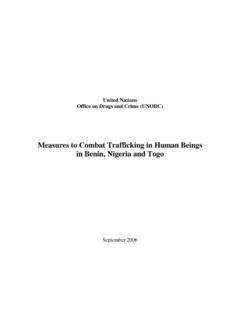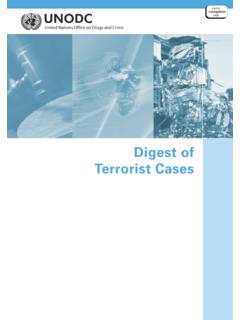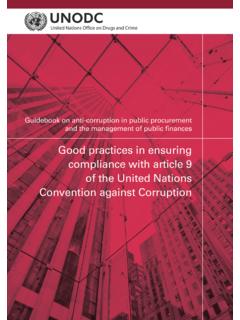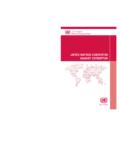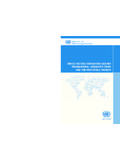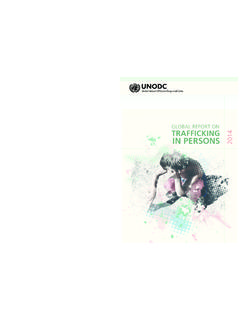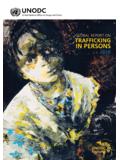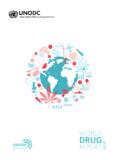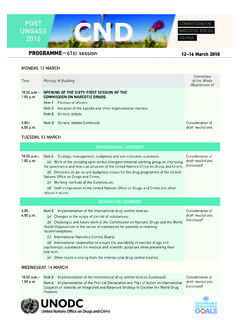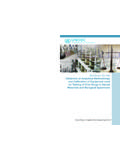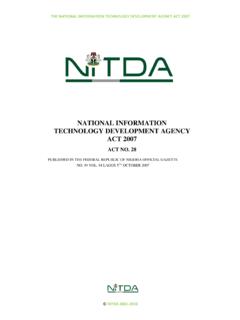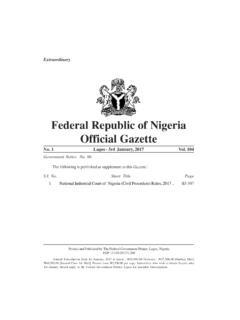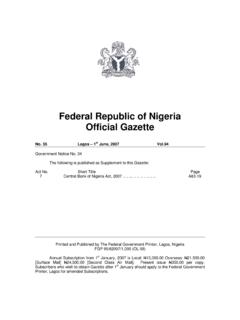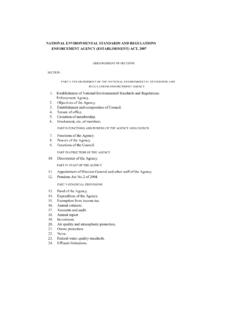Transcription of DRUG USE IN NIGERIA 2018 - United Nations Office on Drugs ...
1 2018. DRUG USE IN NIGERIA . Research Research Research Research EUROPEAN UNION. United Nations Office ON Drugs AND CRIME. Vienna Drug Use in NIGERIA 2018. DISCLAIMER. This document has not been formally edited. The contents of this publication do not necessarily reflect the views or policies of UNODC or contributory organiza- tions, neither do they imply any endorsement. The designations employed and the presentation of the material in this publication do not imply the expression of any opinion whatsoever on the part of UNODC concerning the licit status of any country, territory or city or its authorities, or concerning the delimitation of its frontiers or boundaries. The undertaking of this survey and the development of this report was supported through funding from the European Union as part of the UNODC implemented project Response to Drugs and related organized crime in NIGERIA . PREFACE. The National Survey on Drug Use and Health was con- from this survey will also serve as baseline data for track- ducted by the National Bureau of Statistics (NBS) and ing the Sustainable Development Goals (SDGs) in Nige- the Centre for Research and Information on Substance ria, specifically Goal 3 to ensure healthy lives and promote Abuse (CRISA) with technical support from the United well-being for all at all ages and Target to strengthen Nations Office on Drugs and Crime (UNODC).
2 It was prevention and treatment of substance abuse, including funded by the European Union (EU) under the 10th narcotic drug abuse and harmful use of alcohol. European Development Fund (EDF) as part of the UNODC implemented project, Response to Drugs and It is our sincere hope and expectation that the results and Related Organised Crime in NIGERIA . The project aims the dataset from this survey will be used by the public to support NIGERIA in fighting drug production, traffick- most especially the policy-makers, planners, researchers, ing and use and improved access to quality drug preven- development partners and Non-Governmental Organisa- tion, treatment and care services in NIGERIA . tions (NGOs) to formulate and monitor policies, pro- grammes and strategies that help to develop targeted This is the first comprehensive nationwide national drug services for drug users and their families, with a focus on use survey to be conducted in NIGERIA .
3 The survey has affordable easily accessible community-based approaches three components; the first is the National Household that will increase access to services for this under-served Survey on Drug Use and Health (NHSDUH) conducted population and go a long way in addressing the issue of by NBS; the second aspect is the National Survey on Prob- drug use in communities across the country. lem Drug Use (NSPDU) and the third aspect is the Key Informant Survey (KIS). The NSPDU and KIS were con- We would like to convey the gratitude of the federal ducted by CRISA. The three aspects of the survey cover Ministry of Health and the National Bureau of Statistics all 36 states of the Federation, as well as the federal Capi- to all respondents across the country that provided us with tal Territory. During the National Household Survey, useful information on a rather sensitive topic. Be assured 38,850 households that spread across rural and urban that your information was handled with strict areas were canvassed at respondents' residences.
4 Addition- confidentiality as required by the statistical law in NIGERIA ally, the NSPDU involved interviews with a total of 9,344 ( federal republic of NIGERIA Official gazette , No. 60 Vol. problem drug users across all 36 states of the Federation, 94: Act No. 9 Title: The Statistics Act, 2007) and as per as well as the federal Capital Territory. A total of 2,787 the ethical clearance received form the National Health persons were interviewed for the KIS. Research Committee of NIGERIA (NHREC). We also like to appreciate all staff of NBS and CRISA involved in this The survey provides statistically-sound and policy-relevant exercise, particularly the field staff across the country, for data on the extent and pattern of drug use in NIGERIA , the their dedication and hard work towards the successful socio-demographic characteristics of drug users, their completion of the survey. This is certainly another feat in living conditions and other information such as gender, the ongoing improvements being recorded in the statistical age, marital status, education and employment status.
5 It system, and your efforts and hard work is duly also provides information on age of onset of drug use, fre- acknowledged. quency and pattern of use, high risk drug use as well as extent of Drugs use, drug dependency, and sexual behavior The survey was strictly monitored for quality control by among drug users. This report provides evidence for policy internal NBS staff. In addition, there was external quality makers, both in government and outside government control and monitoring provided by the The Market working in drug and crime control to inform the strategies Research Consultancy Ltd. (MRC) and members of the and policies for drug control, especially on drug treatment Technical Working Group representing various govern- responses and eventually in care access to drug treatment ment ministries, departments, agencies and experts. Their and reduce such habits among Nigerians. Information hard work and commitment is duly acknowledged.
6 3. DRUG USE IN NIGERIA 2018. Finally, we acknowledge the support of the European Union to NIGERIA , especially in the area of strengthening the drug control responses in the country. We extend our sincere appreciation to the United Nations Office on Drugs and Crime for its support in taking forward a bal- anced, human-rights and evidence-based approach to drug control in NIGERIA and for their support in conceptualising and implementing the survey. We would like to particularly acknowledge and appreciate the hard work and commitment of all Ministries, Depart- ments and Agencies (MDAs) of government as well as NGOs who served as members of National Steering and Technical Committees for their valuable inputs and sup- port throughout phases of the survey. Your contributions and commitment to a successful implementation of this survey is appreciated and has made the publication of this report possible.
7 Prof. Isaac F. Adewole, Dr. Yemi Kale FAS, FSPSP, FRCOG, DSc (Hons) Statistician-General of the Federation federal Minister of Health 4. CONTENTS. Preface 3. Acknowledgements 7. Abbreviations and Acronyms 8. Executive Summary 9. KEY FINDINGS 12. THE WAY FORWARD 14. 1. Extent of drug use in NIGERIA 16. Poly-drug use 16. Extent of drug use by geopolitical zones 18. 2. Patterns of drug use 25. Gender and drug use 25. Age and drug use 26. Cannabis 26. Opioids: heroin and pharmaceutical opioids 26. Stimulants: amphetamines, cocaine and ecstasy 27. Non-medical use of other pharmaceutical or over-the-counter Drugs 28. Solvents or inhalants 29. Tobacco and alcohol use 29. Knowledge and awareness about drug use and HIV and AIDS among the general population 29. 3. High-risk drug use 31. People who inject Drugs (PWID) 31. Sexual behaviours 34. Self-reported blood-borne infections and tuberculosis among high-risk drug users 35.
8 4. Health consequences of drug use 36. Drug dependence and severity of dependence among drug users 36. Personal health and drug use among the adult population 38. Provision of structured treatment and other services for drug users 38. Provision of drug treatment services and interventions 40. Barriers to access support and services 41. 5. Social consequences of drug use: harms to others 42. Drug use and the criminal justice system 43. 6. Policy implications and the way forward 44. Drug use survey findings to inform the new National Drug Control Master Plan 2020 2024 44. Affordable and accessible scientific evidence-based drug treatment to be made available for people with drug use disorders 44. Scaling up a comprehensive package of services for prevention, treatment and care of HIV among people who use Drugs in the community and in prison settings 45. Addressing stigma related to drug use 45.
9 Evidence-based drug use prevention programmes 45. Ensure availability of pain medication for medical and scientific purposes while preventing their diversion and misuse, as well as their illicit production or availability in the illicit market 45. Monitoring and evaluation of drug use patterns, emerging trends, and responses to the drug problem 46. NDLEA to implement an intelligence-led policing model targeting mid- to high level traffickers 46. 5. DRUG USE IN NIGERIA 2018. 7. NIGERIA in context 47. Drug supply 47. Drug use 49. Availability, access and control of narcotic Drugs , psychotropic substances and precursor chemicals for medical and scientific purposes 50. Legislative and policy frameworks 50. National Drug Control Master Plan 2015 2109 51. Institutional Framework 51. 8. Annex 53. Ethical Clearance 53. Methodology 53. 6. ACKNOWLEDGEMENTS. The report on drug use and health in NIGERIA 2018 is the Pharmacist Damian Agbo (Co-Investigator for the 2.)
10 Result of a collaborative research effort between the surveys), Senior Pharmacist, Narcotics and Drug Abuse Government of NIGERIA 's federal Ministry of Health Programme, Department of Food & Drug Services. (FMOH), NIGERIA Bureau of Statistics (NBS), Centre for Research and Information on Substance Abuse (CRISA) National Bureau of Statistics, Government of NIGERIA and the United Nations Office on Drugs and Crime Dr. Isiaka Olarewaju, Project Director;. (UNODC) through the European Union (EU) funded Mr. Adeyemi Adeniran, Project Coordinator;. project Response to Drugs and Related Organized Crime Mr. Ajebiyi Fafunmi, Head of ICT;. in NIGERIA '. The authors acknowledge the contributions Ms. Nemi Okujagu, Technical Assistant to the of the members of the National Steering Committee and Statistician General. the Technical Working Group who shared knowledge and provided guidance and oversight for the surveys.
